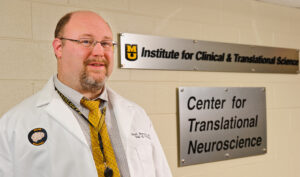Who: Dr. David Beversdorf, William and Nancy Thompson Endowed Chair of Radiology, professor of radiology, neurology and psychology, MU School of Medicine.
Bio: Dr. Beversdorf grew up in Bloomington, IN and received his bachelor’s and medical degrees from Indiana University. Dr. Beversdorf has been on the University of Missouri faculty and has been involved with the Thompson Center since 2008.
What are your research Interests?
“My Cognitive Neuroscience Laboratory currently is investigating autism, dementia, the cognitive effects of stress, the cognitive neuroscience of problem-solving ability, functional neuroimaging, and pharmacological modulation of cognition. We have a particular interest in the neuropsychopharmacology of autism. This is the study of the neural mechanisms that drugs act upon to influence behavior. We focus on the role of the noradrenergic system, which is a system in the brain and body that functions as a hormone and neurotransmitter. We also are involved in the search for biomarkers that relate to autism treatment response, including imaging markers, to identify which types of patients will respond to which treatments.”
How did you first get involved with autism research?
“I have always been interested in how we think— our higher cognitive function. Then I learned about autism, and in many cases, their thinking is excellent, but they still struggle in society. At first I was interested in why that occurred, and later, what can we do to help improve those challenges.”
What one thing do you hope to discover or understand better by the end of your career?
Ultimately, I would like to help lead us to a better understanding of how autism breaks down into meaningful subgroups that are helped by specialized treatment approaches for those subgroups. In addition, I would like to characterize some of these particular subtypes of autism (such as prenatal stress exposure history) to understand in greater detail how to help these specific groups. I also want to characterize particular treatments and understand which subtypes of autism respond to that treatment.”
What motivates you to work so hard in this field?
“Our patients—I want to bring benefits that help them as much as possible.”


